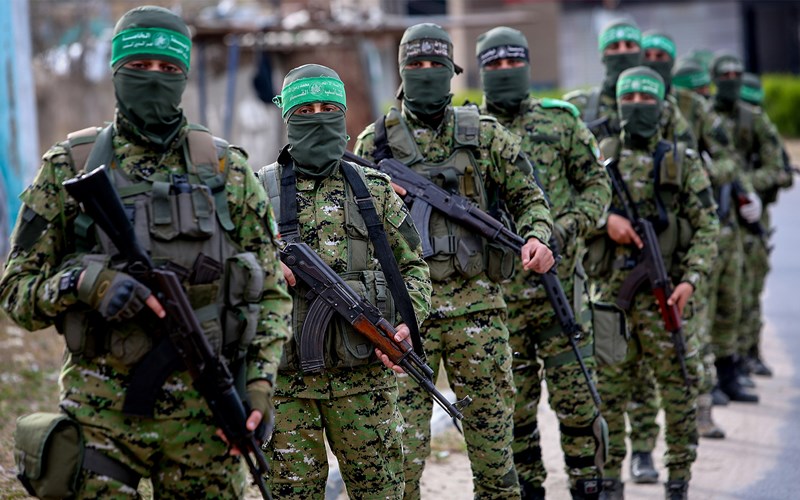Veteran analysts with the nonprofit Washington Institute for Near East Policy, whose mission is to offer "balanced and realistic understanding of American interests in the Middle East," say Hamas has seen a financial gain of $500 million since the start of its war with Israel, mostly by selling the aid intended for civilians.
This view is supported by Israel's domestic security agency, Shin Bet, which has said Hamas diverts at least 60% of the goods entering Gaza for their own purposes, The Jewish News Syndicate reported this week.
Since the JNS report, the United Nations announced it will suspend food distribution in Rafah because of a lack of security and supplies, Axios reported.
"This shouldn't be a surprise to anybody when Hamas controls civilian operations in Gaza largely because the United States has made it very clear to Israel that it doesn't want Israel to control them, including the distribution of food," Caroline Glick, the senior contributing editor with JNS, said on Washington Watch Thursday.
Rare admission by Palestinian TV
In April, Fatah TV – headquartered in Ramallah and affiliated with The Palestinian National Authority – reported that Hamas had killed aid workers and was stealing food for itself, according to Palestinian Media Watch, a non-governmental organization and media watchdog group.
"In an incredible and rare admission, Fatah has corroborated what Israel has been saying all along: that Hamas is responsible for turmoil connected to distribution of the humanitarian aid sent into Gaza. A Fatah TV anchor reported that throughout the war, Hamas has been committing what is essentially a triple crime – it has attacked and killed aid workers in order to control aid distribution, stolen the food and water for itself, and caused food prices to skyrocket," Palestinian Media Watch reported.

"So, this entire thing is humanitarian aid for Hamas. Hamas is receiving all of the aid because they purloin everything," Glick told show host Tony Perkins.
The blocking of aid by Israel, the claims of barbaric behavior by the Israel Defense Forces, have all been an elaborate – and wildly successful – marketing strategy by Hamas, Glick said.
"Israel has facilitated the entry of half a million tons of humanitarian aid into Gaza including almost 20,000 trucks of food while Hamas has been bombing humanitarian crossings, damaging water pipes, and stealing aid from the people of Gaza," IDF spokesman Daniel Hagari, told reporters this week.
The U.S. spent $320 million to build a pier to deliver aid by sea. The pier, intended to be temporary, has been operational for a month. Pentagon spokesman Patrick Ryder said this week that 569 tons of aid has reached Gaza through the pier, but none has been distributed – at least not by official means.
Part of the problem is that desperate civilians have looted aid trucks as soon as they've seen them.
This New York Times report doesn't mention Hamas theft but says 11 of 16 trucks that left the pier last Saturday were looted on their way to a World Food Program warehouse. The report does mention "strict Israeli inspections and restrictions at crossing points."
"It's all this pathetic lie, and it's all geared toward exactly what we're seeing from the International Criminal Court which is the claims of starvation, which are untrue; the claims of deliberate starvation, which are untrue; the claims of famine, which are untrue; the claims that Israel deliberately targets civilians for killing, which are untrue," Glick said.
Where is all the aid going?
While there are scenes of desperation, aid and food, as the Pentagon reports, has reached the Gaza shores.
The Family Research Council reports that 300,000 tons of food and beverages have been delivered to Gaza, an average of 200 truckloads a day. There have been no reports of looting on such a scale as that.
Glick contends the humanitarian crisis is way overblown and that focus should be on Israeli hostages that Hamas continues to hold.
"I don't know how terrible a humanitarian crisis there is at all. Aside from the canned photographs that you see all of these pro-Hamas activists putting on their Twitter feed and everything else, there hasn't been any documented evidence that anybody is starving in Gaza except for the 128 hostages. Those are the only people we know for certain who are starving," she said.
On the flipside, food could be causing some terrorists to be a little slow in getting away from IDF troops.
"Most of the terrorists that Israel has arrested during the course of the war have been fat to obese. We're not seeing any food shortages among the members of Hamas who we're seeing," Glick said.
Even among civilians the absence of food has not been obvious, Glick said.
"They just celebrated the month of Ramadan, their holy month. There were no reported shortages of food for Ramadan, so all of this just a fabrication, and it's used in order to foment an Israeli defeat in this war. That's what it's all about."
Aid crisis, ICC go hand in hand
Images and stories of suffering and threats of arrests for Israeli officials through the International Criminal Court are working in concert, Glick said.
"All of these things are geared toward one goal – for Israel to be forced to capitulate to international pressure and allow Hamas to survive. These are all demands that are being made, all allegations utterly false being waged against Israel because the people who are waging them want Israel to lose this war."







